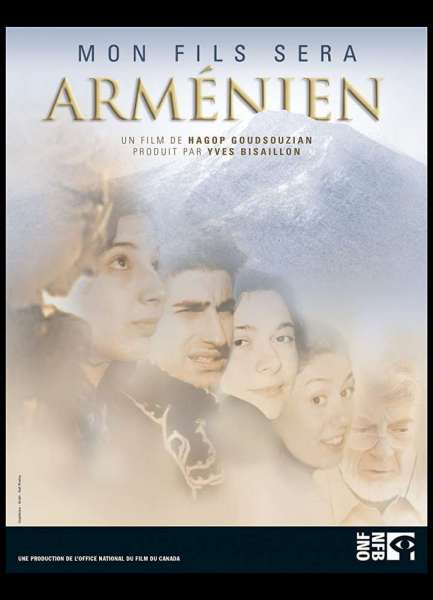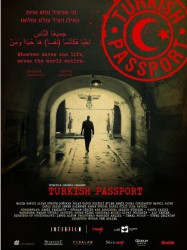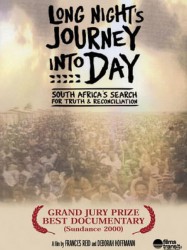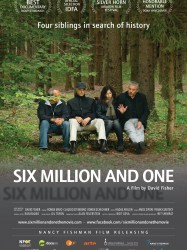My Son Shall Be Armenian est un film canadien de genre Documentaire
My Son Shall Be Armenian (2004)

Si vous aimez ce film, faites-le savoir !
- Infos
- Casting
- Infos techniques
- Photos
- Vidéos
- Passages TV
- Citations
- Personnages
- Musique
- Récompenses
My Son Shall Be Armenian (Original French title: Mon fils sera arménien) is a 2004 Canadian documentary by Hagop Goudsouzian, who travels to Armenia and Syria with five other members of Montreal's Armenian community who lost relatives in the Armenian Genocide, to speak with survivors.
In Syria, Goudsouzian films in Deir ez-Zor, where thousands of Armenians were said to have been killed. In one scene, he scrapes the soil around a church and discovers the remains of what appears to be a mass grave, scooping up bones, a wedding ring and a bullet. In Armenia, Goudsouzian visits villages that had been renamed for former settlements, finding elders who recount what had occurred to their parents and siblings.
My Son Shall Be Armenian incorporates archival photographs and footage from a Hollywood silent movie based on the accounts of one survivor who escaped to the United States during the genocide. Participants in the film include Canadian TV host Patrick Masbourian.
My Son Shall Be Armenian was produced in French by the National Film Board of Canada.
Commentaires
Postez un commentaire :
Suggestions de films similaires à My Son Shall Be Armenian
Il y a 8958 ayant les mêmes genres cinématographiques, 10575 films qui ont les mêmes thèmes (dont 93 films qui ont les mêmes 7 thèmes que My Son Shall Be Armenian), pour avoir au final 70 suggestions de films similaires.Si vous avez aimé My Son Shall Be Armenian, vous aimerez sûrement les films similaires suivants :
 , 1h31
, 1h31Réalisé par Errol Morris
Origine Etats-Unis
Genres Drame, Documentaire
Thèmes La prison, Le racisme, Religion, Documentaire sur la discrimination, Documentaire sur le droit, Documentaire sur la guerre, Documentaire historique, Documentaire sur une personnalité, Documentaire sur la religion, Politique, La peine de mort, Religion juive, Documentaire sur la Seconde Guerre mondiale, Documentaire sur la police, Négationnisme
Acteurs Errol Morris
Note74%





Ce documentaire traite de Fred A. Leuchter Jr. qui a travaillé dans le domaine des techniques d'exécution, puis témoigné en faveur du négationniste Ernst Zündel lors de son procès en 1988, avant de voir ses qualifications et titres démentis et de perdre son emploi.

Turkish Passport (2011)
, 1h31Genres Drame, Documentaire, Historique
Thèmes Le racisme, Religion, Documentaire sur la discrimination, Documentaire sur le droit, Documentaire sur la guerre, Documentaire historique, Documentaire sur une personnalité, Documentaire sur la politique, Documentaire sur la religion, Politique, Religion juive, Documentaire sur la Seconde Guerre mondiale
Note79%





Turkish Passport tells the story of diplomats posted to Turkish embassies and consulates in several European countries, who saved numerous Jews during the Second World War. Whether they pulled them out of Nazi concentration camps or took them off the trains that were taking them to the camps, the diplomats, in the end, ensured that the Jews who were Turkish citizens could return to Turkey and thus be saved. Based on the testimonies of witnesses who traveled to Istanbul to find safety, Turkish Passport also uses written historical documents and archive footage to tell this story of rescue and bring to light the events of the time. The diplomats saved not only the lives of Turkish Jews, but also rescued foreign Jews condemned to a certain death by giving them Turkish passports. In this dark period of history, their actions lit the candle of hope and allowed these people to travel to Turkey, where they found light. Through interviews conducted with surviving Jews who had boarded the trains traveling from France to Turkey, and talks with the diplomats and their families who saved their lives, the film demonstrates that "as long as good people are ready to act, evil cannot overcome".

Reshimat Ahava (2000)
, 1h30Genres Documentaire
Thèmes La famille, Le racisme, Religion, Documentaire sur la discrimination, Documentaire sur le droit, Documentaire sur la guerre, Documentaire historique, Documentaire sur une personnalité, Documentaire sur la religion, Politique, Religion juive, Documentaire sur la Seconde Guerre mondiale
Note69%





After the death of their parents, Filmmaker David Fisher feels that his family has grown apart and that his siblings are focused on their careers and relationships with their spouses and children. Fisher believes that a search for their sister, who was allegedly taken from their parents at birth, will help them bond.

Umurage (2002)
, 52minutesOrigine Espagne
Genres Documentaire
Thèmes Afrique post-coloniale, Le racisme, Documentaire sur la discrimination, Documentaire sur le droit, Documentaire sur la guerre, Documentaire historique, Documentaire sur une personnalité, Documentaire sur la politique, Politique
Au Rwanda, une centaine de membres de l’association Ukuri Kuganze, essentiellement formée de survivants du génocide, et quelques-uns de leurs bourreaux, libérés après d’être confessés et avoir demandé pardon en 2003, se réunissent dans un centre de réinsertion. Ces bourreaux retournent chez eux, souvent dans les lieux mêmes où ils ont perpétré leurs crimes et ils doivent « faire face » à leurs victimes et leur demander pardon. En 1994, en l’espace de 100 jours, près d’un million de personnes avaient été assassinées, soit près de 10 000 morts chaque jour.

Shadows of Memory (2000)
, 43minutesGenres Documentaire
Thèmes Le racisme, Religion, Documentaire sur la discrimination, Documentaire sur le droit, Documentaire sur la guerre, Documentaire historique, Documentaire sur une personnalité, Documentaire sur la religion, Politique, Religion juive, Documentaire sur la Seconde Guerre mondiale
 , 1h4
, 1h4Réalisé par Matej Mináč
Genres Documentaire, Historique
Thèmes Le racisme, Religion, Documentaire sur la discrimination, Documentaire sur le droit, Documentaire sur la guerre, Documentaire historique, Documentaire sur une personnalité, Documentaire sur la religion, Politique, Religion juive, Documentaire sur la Seconde Guerre mondiale
Acteurs Karel Reisz
Note81%





Partez à la rencontre de Nicholas Winton, véritable héros d'avant-guerre. Jamais considéré comme tel, cet homme a pourtant sauvé 669 enfants à la veille de la Seconde Guerre mondiale. Dans la capitale tchécoslovaque, alors qu´il se préparait pour des vacances au ski, le jeune Nicholas Winton va organiser une extraordinaire opération de sauvetage d'enfants juifs menacés par les nazis.
 , 1h34
, 1h34Origine Etats-Unis
Genres Documentaire
Thèmes Afrique post-coloniale, Le racisme, Documentaire sur la discrimination, Documentaire sur le droit, Documentaire sur la guerre, Documentaire historique, Documentaire sur une personnalité, Documentaire sur la politique, Politique
Acteurs Helen Mirren
Note75%






Les Derniers jours (1998)
, 1h27Réalisé par James Moll
Genres Drame, Guerre, Documentaire, Historique
Thèmes Le racisme, Religion, Documentaire sur la discrimination, Documentaire sur le droit, Documentaire sur la guerre, Documentaire historique, Documentaire sur une personnalité, Documentaire sur la religion, Politique, Religion juive, Documentaire sur la Seconde Guerre mondiale
Note78%





Le documentaire relate l'histoire de cinq juifs hongrois durant l'holocauste, en s'intéressant notamment à la vie dans les camps de concentration et au désir de vivre des prisonniers.

Six Million and One (2012)
, 1h33Genres Documentaire
Thèmes Le racisme, Religion, Documentaire sur la discrimination, Documentaire sur le droit, Documentaire sur la guerre, Documentaire historique, Documentaire sur une personnalité, Documentaire sur la religion, Politique, Religion juive, Documentaire sur la Seconde Guerre mondiale
Note66%





Joseph Fischer's memoir was discovered only after his death. His children refused to confront it, except for David, the filmmaker, for whom it became a compass for a long journey. When David found it unbearable to be alone in the wake of his father's survival story and in his struggle not to lose his sanity, he convinced his brothers and sister to join him in the hope that this would also contribute to releasing tensions and bring them as close as they used to be. His siblings, for their part, couldn’t understand why anyone should want to dig into the past instead of enjoying life in the present. The journey eventually leads the Fishers into the dark depths of the B8 Bergkristall tunnels, part of the Austrian KZ Gusen II concentration camp, where their father endured forced labor during the Holocaust. Illuminated only by flashlights, they seek meaning in their personal and family histories and undergo surgical and revealing discussions about family, survival and individualism only to come to the realization that they are unable to fully understand their father's past and the events that haunted him. Joseph Fischer's last couple of weeks at Gunskirchen concentration camp, were an inhuman experience that blocked his writing. In order to find out what his father failed to describe about Gunskirchen's liberation David located veterans of the 71st Infantry Division who liberated the camp. The elderly soldiers are still haunted and traumatized by the horrific sights they came across when entering the camp. Through their journey, the Fishers become emblematic of the entire second generation who are still grappling with the experience of their survivor parents.

Der gelbe Stern (1981)
, 1h29Réalisé par Dieter Hildebrandt
Genres Documentaire
Thèmes Le racisme, Religion, Documentaire sur la discrimination, Documentaire sur le droit, Documentaire sur la guerre, Documentaire historique, Documentaire sur une personnalité, Documentaire sur la religion, Politique, Religion juive, Documentaire sur la Seconde Guerre mondiale
Note71%





 Connexion
Connexion